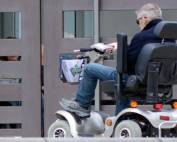Mobility Scooters Guide
We help you choose the best product on the market. We provide trusted advice and guidance about mobility scooters.
We reviewed the most popular mobility scooters on the market so you can choose the best one perfect to your needs. There is a lot different makes and models with prices starting from few hundreds pounds and ending at few thousand pounds or more.
Cheap Mobility Scooters
Cheap doesn’t mean poor quality or basic functionality. Cheaper models are usually slightly smaller Class 2 mobility scooters. They still provide great functionality and features. The main difference between bigger and more expensive models is that they are equipped with smaller batteries and can handle less weight. Because they are less powerful you would not go as far as more expensive models. The longest range is usually about 10 miles. Having this in mind they are still great alternative to much more expensive Class 3 types.
It is important to decide on the budget first and than focus on features, performance and important functionality. Some important factors to look at are: weight limit, battery performance, speed, size, storage space, control functions, range, seating type and many other specifications which may be very important to you.
Class 2 vs Class 3 Mobility Scooters
Make sure you understand the difference between Class 2 and Class 3 mobility scooters. Class 3 scooters are usually larger, more expensive and provide similar functionality to what you would find in cars. Although the most important difference is that the mobility scooters class 3 can be driven on roads with maximum speed of 8mph.
Folding & lightweight mobility scooters
Depending on what is very important to you consider the following mobility scooters categories: folding mobility scooters, large mobility scooters, lightweight mobility scooters and medium pavement mobility scooters.
Mobility Scooters Accessories
If you are a happy owner of mobility scooter or planning to buy one you might be interested in getting some accessories for it too. We collected and reviewed the best and most popular accessories for mobility scooters. Have a look at the following accessories: thresholds, alarms, covers, bags, batteries, chargers, tyres, baskets, canopies, sheds, mirrors, trailers and many more.
Mobility Scooters Brands
Latest Mobility Scooter Posts
Addressing the Rising Risk: UK Mobility Scooter Users Face Increased Dangers on the Road
Recent research on UK traffic data has spotlighted a concerning trend for mobility scooter users. According to the Department for Transport's (DfT) latest road casualty statistics, these individuals are significantly more vulnerable on the roads, [...]
Can I use mobility scooter if I have Osteoarthritis?
Osteoarthritis, a condition characterized by the degeneration of joint cartilage and underlying bone, often leads to pain, stiffness, and decreased mobility. As it progresses, this common form of arthritis can significantly impede daily activities, making [...]
Can I drive a mobility scooter without UK driving licence?
In the United Kingdom, you do not need a full driving licence to operate a mobility scooter. However, certain regulations and requirements must be met to ensure you are using the scooter safely and lawfully. [...]
Do You Need an Eye Test to Drive a Mobility Scooter?
The short answer is: No, you are not legally required to take an eye test specifically to drive a mobility scooter in the UK. However, having good eyesight is critical for your safety and that [...]
What Are the Rules for Driving a Mobility Scooter in the UK?
Driving a mobility scooter in the UK comes with a set of specific rules and guidelines. It is essential to be informed about these regulations to ensure the safety of both the driver and the [...]
Do Young People Use Mobility Scooters?
The common perception often associates mobility scooters with the elderly or those with significant physical impairments. However, this narrative is increasingly out of touch with the current landscape. In the UK, young people are also [...]










